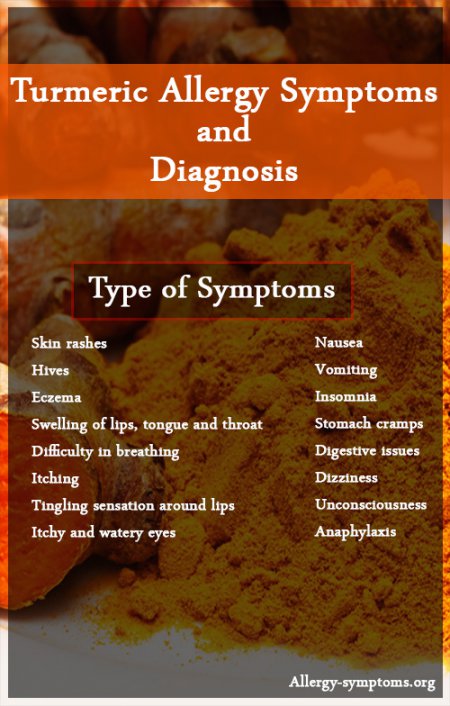
Turmeric is a flowering plant which is used as spice to give its yellow color to the recipe. In India it has been used for thousands of years as spice and also has medicinal properties.
Curcumin is one of the main active ingredients in turmeric that has the powerful anti-inflammatory effects which is also a very strong antioxidant. Turmeric is extracted from curcumin where it is poorly absorbed into the bloodstream.
This yellow coloured spice is prominent for its antibacterial and antibiotic properties all around the world. In India, turmeric powder is widely used for medical, cosmetic and culinary purposes.
Curcumin, a compound that is present in turmeric powder is associated with certain side effects. When hypersensitive person ingests this spice, he may experience turmeric allergy symptoms.
Let us think for a minute that, how can a natural remedy which is used to treat and reduce allergic reaction over the skin can itself stimulate the reaction?
In 1910, curcumin is separated and included in other chemical ingredient substances. One case of allergic reaction reported in 1998 state that the person who was interacting with curcumin food colouring experienced contact dermatitis.
Another case was reported by Drugs.com, where a person who consumed turmeric had seen anaphylaxis situation.
Why do people prefer to eat Turmeric?
Turmeric also comes with many health benefits which are reduces inflammation, improved antioxidant status, improves blood vessels function, reduces the risk of heart attack, it can help in preventing cancer, treats Alzheimer’s disease.
People who are suffering from Arthritis can respond well to curcumin supplements because they contain anti-inflammatory compounds which helps in getting better results who are suffering from arthritis.
Turmeric is used for many purposes such as, it is used as a spice, food dye, or to add both and colour to the food. Moreover, it has also been widely consumed for its health benefits. The main active ingredient of turmeric, curcumin has many benefits such as:
Reduces Inflammation
According to a report, chronic inflammation is linkedto many diseases. Therefore, doctors recommend immediate treatment for inflammation, before it getsout of hands. Curcumin in turmeric reduces the levels of inflammatory markers in a human body.
Improved Antioxidant Status
A human body must have all the required antioxidants. Turmeric is one of the powerful antioxidantsthat is addedto improve the antioxidant status in a human body.
Improve Blood Vessels Functions
Some studies suggest that turmeric has the potential to promote the opening of blood vessels, increasing blood flow and reducing blood pressure. Due to this reason, many doctors recommend turmeric milk when an individual is suffering from a fever.
Reduced Heart Attack Risk
Due to the anti-inflammatory effects present in the turmeric, it lowers the risk of heart attacks.
However, even though turmeric has some of the best health benefits, it also has caused some serious allergy to some people.
Turmeric Allergy Symptoms
Turmeric is a natural plant but these also comes with several side effects like that may lead to excessive bleeding, gastrointestinal problems, risk of gallstones, can lower blood pressure, risk of increasing kidney stones, may cause allergic reactions. These symptoms are caused by consuming turmeric.
When you apply turmeric to skin or face it can temporarily leave a yellow stain and residue, this normal as turmeric is yellow in colour and can leave stains behind no need to worry about it. But if you are allergic to turmeric then it may cause irritation, redness, and swelling when comes in direct contact with skin.
Allergic reaction on face can be seen when you consume over dose of turmeric in your diet or you try using it in your face packs. Patch test before you use any of the products so see the reactions. If no reactions are caused then you are safe to use the product directly on face.

Allergic reaction or side effects of natural ingredients are very rare. However, in a few people compounds due to adverse reaction of the immune system, they see uncommon signs after consuming turmeric powder.
There are cases where the person experienced the allergic reaction just by touching and inhaling the allergic food substance. Depending on the person triggers and the impact of the allergy may differ.
It’s good to patch test before using any substance if you aren’t sure about it.
As soon as a hypersensitive person ingest turmeric or turmeric included food substances, the immune system released histamines stimulate a chemical reaction that may affectyour whole body.
- Skin rashes
- Hives
- Eczema
- Swelling of lips, tongue and throat
- Difficulty in breathing
- Itching
- Tingling sensation around lips
- Itchy and watery eyes
- Nausea
- Vomiting
- Insomnia
- Stomach cramps
- Digestive issues
- Dizziness
- Unconsciousness
- Anaphylaxis
Turmeric allergy symptoms can be mild or moderate, in rare cases with persist use of the allergic food substance the reaction may lead to life-threatening condition.
Side Effects of Turmeric and Safety Precautions
For sure,some turmeric allergy reactions can be avoided if taken necessary precautions.
Turmeric is likely safe when it is taken orally for up to 12 months. Even though turmeric does not cause any serious side effects, however, some people sometimes experienced upset stomachs, nausea, dizziness, and diarrhoea.
According to a study, an individual who takesa high amount of turmeric, almost over 1000-1500 mg twice daily, is likely to experience a dangerous abnormal heart rate.
Turmeric is safe when applied to the skin and it is also safe to use turmeric inside the mouth as a mouthwash. Moreover, turmeric is also safe when it is used as an enema.
Special Precautions and Warnings for Turmeric
Pregnancy and Breast-feeding
Even though people use turmeric for allergy relief during pregnancy, however, many doctors suggest reducing the consumption of turmeric during pregnancy. According to some doctors, excessive intake of turmeric during pregnancy and breast-feedingpromotes a menstrual period or stimulates the uterus, putting the pregnancy at risk. The doctor decides the consumption of turmeric during pregnancy and breast-feeding according to your weight, mass, complication during pregnancy (if any), etc.
Gallbladder Problems
Someone who is suffering from gallbladder problems should avoid the consumption of turmeric, as it can make gallbladder problems worse. Also, never use turmeric if you have gallstones or a bile duct obstruction.
Bleeding Problems
An individual who faces bleeding and the bruising problem should avoid the regular intake of turmeric, as it slows down the blood clotting. This leads to an increasein bruising and bleeding in people.
Diabetes
An ingredient Curcumin that is found in turmeric might decrease the blood sugar level in those people who have diabetes problems. Due to this, many doctorsrecommendavoiding the intake of turmeric in their day-to-day life. Moreover, even for someone who is not diabetic should avoid the regular consumption of turmeric, as the low number of blood sugar can lead to mild to severe health problems.
Gastroesophageal Reflux Disease
In some people, regular consumption of turmeric can cause an upset stomach. It might make some of the stomach problems such as GERD worse. In case, you see worse symptoms of GERD, firstly stop the intake of turmeric and visit the doctor.
Cancer: breast cancer, uterine cancer, ovarian cancer, endometriosis, or uterine fibroids
Curcumin in turmeric sometimes acts like a hormone estrogen. According to some doctors, turmeric might make hormone-sensitive conditions worse. While some researchers show that turmeric reduces the effects of estrogen in some hormone-sensitive cancer cells. Therefore, while in some cases, turmeric has beneficial effects on hormone-sensitive conditions, in some situations intake of turmeric is hazardous. Therefore, consult your doctor before adding turmeric in your daily diet.
Infertility
In some cases, turmeric lowers the testosterone levels as well as decreases the sperm movement. This leads to a reduction in fertility. Therefore, many doctors recommended controlling the consumption of turmeric who are trying to have a baby.
Iron Deficiency
The majority of people do not know; however, taking a higher amount of turmeric sometimes prevents the absorption of iron. Therefore, someone who has iron-deficiency should avoid the consumption of alcohol daily.
Surgery
As mentioned above, turmeric slows down blood clotting. Moreover, sometimes it causes extra bleeding during and after surgery. Someone who is about to have a surgery should stop using turmeric at least two weeks before a scheduled surgery.
Diagnosis
When you see any reaction on your skin or body then try dealing it with home remedies first as they can be helpful in case of emergency if there is any reduction then no need to worry but if there is no reduction of reactions see the doctor without any delay as it may lead to huge damage.
Allergist or physician will conduct a skin prick test to check the availability of turmeric allergens.
Once it’s confirmed, avoid internal and topical application of turmeric. Read labels before purchase and check with the restaurant authority about the ingredients included in the dish.
Make sure your family and close friends know that you’re allergic to turmeric, so they could help you to avoid this spice completely.
Even if you are not allergic now, check with your doctor before you start increasing turmeric dosage. Apart from an allergic reaction, this yellow coloured spice can have mild side effects with excess amount of intake.
Discuss about turmeric allergy with your doctor, so that you can replace other spices which are harmless alternatives.

